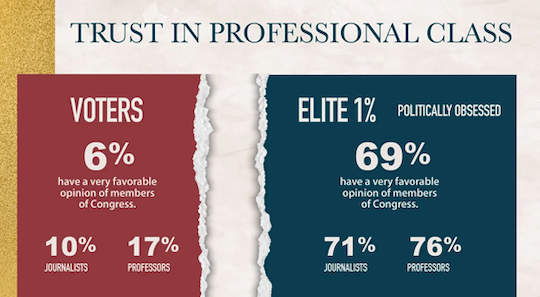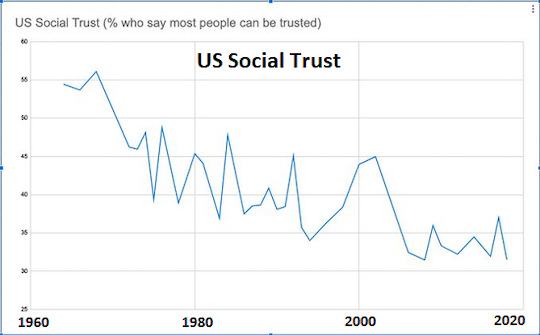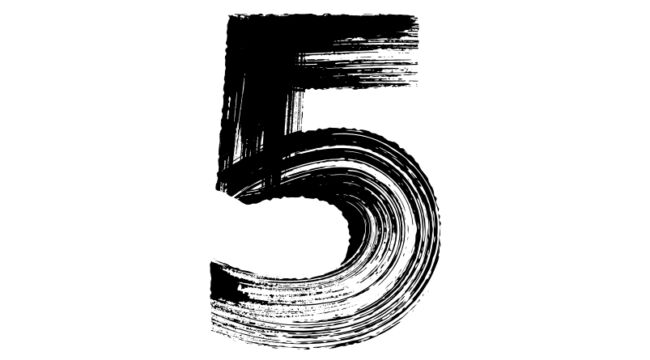Five Themes Will Decide This Decade
Morgan Stanley recently came out with their three themes that will impact markets for many years: longevity, AI tech diffusion and decarbonization, i.e. the transition from hydrocarbon fuels to so-called “green energy.”
In a nutshell, pills that cost $1,000 a month will make us live longer, AI will increase corporate profits (which is the entire point of the economy, of course) and those who invest in the “green energy” transition will be rewarded with fabulous wealth.
That all sounds peachy, but the real world will be defined by four much different themes: sclerosis, dysfunction, debt saturation and power asymmetry.
1. Sclerosis: the same old nodes of power cling onto power and so nothing changes because nothing can change: Those in power must maintain or expand their power, regardless of what comes along, and that sclerosis is the systemic problem that cannot be resolved.
2. Dysfunction: Nothing works due to the consequences of sclerosis: Those who cling to power do so by eliminating every dynamic of open, self-correcting systems: They get rid of competition (every sector is dominated by monopolies, cartels or state cartels), they get rid of transparency (information asymmetry is how they maintain power) and they have a lock on regulatory complexity/capture:
First jump through all these hoops and maybe we’ll let you propose some worthless policy tweak that leaves our power intact. Or we’ll co-opt you by inviting you to become one of our flunkies, PR flacks, factotums, enforcers, lackeys, etc.
In a system rigged to maximize the profit and power of the few at the expense of the many, nothing works because the system is no longer capable of self-correction.
Debt Saturation
3. Debt saturation: 15 years of expanding credit has created the illusion we can pay for everything, no matter how costly, from future earnings, basically forever. So we need trillions to transition to “green energy”: No problem, we’ll borrow it.
We need more trillions to pay for an aging, increasingly sickly populace. No problem, we’ll borrow it. We need to borrow more trillions to fund all the status quo grift and graft: No problem, we’ll borrow it.
And since we can pin interest rates to zero forever, we can borrow whatever tiny sums we need to pay the interest on hundreds of trillions in new debt, no problem. Except for one little dynamic called debt saturation:
Future earnings are not guaranteed, and at some point the income cannot sustain both the eternally expanding consumer and state spending needed to keep the whole thing from imploding and the rising debt service on the ballooning debt.
We can afford only one: either borrow and spend to keep the machine humming, or we can devote that income to servicing rising debt. We can’t do both, so one or the other will collapse: either consumer/state borrowing and spending or the Palace of Debt.
The Dilemma
This reality increases risk, and capital eventually demands a real return. Interest rates can’t stay at zero, so the costs of servicing the soaring debt rise rapidly.
At the same time, the immense expansion of credit — money borrowed from future income to be spent today — generates inflation, as the flood of credit needed to keep a sclerotic, dysfunctional status quo afloat outpaces the value being generated by all the trillions being borrowed and blown.
No one at the trough of “free money” will give up their place, and so the system is rigged to fail: We have to keep borrowing trillions to keep all the incumbents, entrenched interests and those collecting benefits happy, but as interest payments rise, we need to borrow more trillions just to pay the interest. And so on, in a self-reinforcing feedback loop.
4. Power asymmetry is my term for the structural inequality and bondage that characterize the global status quo. The many have very little power over anything, while the few hoard the power to make sure they keep what they have and to protect their perquisites from competing elites and populist movements.
Debt serfdom is a good example of bondage — you need to borrow to live — and power asymmetry: Debt-serfs have essentially zero power in the economy, society or the sclerotic systems of governance.
No amount of AI or new technology will change any of this, because all those tools serve those already in power. In effect, AI and all other new technologies simply serve to solidify power asymmetry and thus sclerosis and dysfunction.
And since the system demands “free money” borrowed from the future to keep everyone at the trough happy, it also guarantees debt saturation, which eventually triggers a phase change much like liquid water (liquidity) suddenly freezing into ice.
Everyone at the trough believes that the transition from liquid water (free flowing credit) to ice cannot possibly happen. So when it happens, everyone will be surprised. What do you mean, there are limits?
The Fifth Trend: Nobody Trusts Anyone
Here’s another trend: the decline of social trust.
Social trust has declined significantly in the United States. Surveys find that public trust in institutions and the professional classes that dominate those institutions has cratered. (See chart below.) Social trust — our confidence that other people are trustworthy— has also fallen to multidecade lows.
This was not the case in decades past. Americans maintained high levels of trust in their institutions, government and fellow citizens. The decline in social trust is across the entire spectrum: Our trust in institutions, professional elites and our fellow Americans has declined precipitously.
The causes of this decay of social trust can be debated endlessly, but several factors are obvious:
1. Institutions forfeited the trust of the citizenry by withholding/editing realities to serve the interests of hidden agendas and insiders’ careers. The Vietnam War was pursued on fabrications, as was the second Gulf War to topple Saddam. Watergate eroded trust on multiple levels, as did the Church Committee’s investigation of America’s security agencies’ domestic spying/overreach.
2. The managerial/professional elites at the top of the nation’s institutions no longer put the citizenry’s interests above their own. The public’s trust has eroded as institutions are primarily viewed as vehicles for self-enrichment and career advancement.
Health care CEOs pay themselves millions, higher education is bloated with layers of non-teaching administration, defense contractors and the Pentagon have greased the revolving door to the benefit of incumbents and insiders and so on, in an endless parade of self-serving cloaked with smirking PR claims of “serving the public.”
The Consequences of a Low-Trust Society
The shift from a high-trust society to a low-trust society is consequential economically, politically and socially. Low-trust societies have stagnant economies, as nobody trusts anyone they don’t know personally or through personally trusted networks, and nobody trusts institutions to function effectively or fulfill their stated mission to serve the public good.
Faced with incompetent, unaccountable, corrupt bureaucracies and a culture overflowing with scams, frauds, imposters and get-rich-quick schemes, people give up and drop out. Rather than start a business and accept all the risks just to get dumped on or ripped off, they don’t even try to start a business. Given the financial insecurity that is now the norm, they decide not to get married or have children.
The vast trading networks of the Roman Empire were based on personal trusted networks and trust in Rome’s functionaries/institutions. The owners of trading ships dealt with trusted captains and merchants, who then paid duties to Roman functionaries in Alexandria and other major trading ports.
In other words, tightly bound personal trusted networks work well as long as the state institutions that bind the entire economy are trusted as fair and reliable — not perfect, of course, but efficient and “good enough.”
But when public institutions are viewed as unfair, unreliable, corrupt or incompetent, the entire economy decays. Even personal trusted networks cannot survive in an economy of unfair, unreliable, corrupt or incompetent state bureaucracies and private institutions.
I Trust You to Rip Me Off
The American economy is now dominated by enormous privately owned and managed monopolies and cartels that are the private-sector equivalent of self-serving state bureaucracies.
Big Tech, Big Pharma, Big Health Care, Big Ag, Big Finance, etc., are even worse than state bureaucracies because there are no legal requirements for transparency or recourse. Try getting a response from a Big Tech corporation when you’ve been shadow-banned or sent to Digital Siberia.
The sole remaining reservoirs of trust in American life are personal networks, local enterprises and local institutions. These are not guaranteed, of course; in many locales, even these reservoirs have been drained.
But in other locales, enterprises and institutions such as the county water utility, the local newspaper, the local community college, etc., continue to earn the trust of the public by performing the services they exist to provide effectively and at a reasonable cost.
The larger the institution and the greater its wealth and power, the lower the social trust — for good reasons. The greater the influence of the managerial elites, the greater the disconnect from the everyday experiences of the citizenry and customers, and the more extreme the self-serving PR.
Sure, I trust Big Tech, Big Pharma, Big Health Care, Big Finance — to rip me off, profiteer, send me obfuscating bills, jack up junk fees, make it impossible to contact them and send me to Digital Siberia if I complain.
The divide between the elites and the commoners should prompt us to examine the low-trust path we’re sliding down:

In a society in which everything is phony, low-quality or fraudulent, you’re taking a chance trusting anyone you don’t know personally — and even that can be risky now that self-aggrandizing flimflam is the last remaining path to financial security for non-elites.

A low-trust society is an impoverished society, economically stagnant and socially threadbare. That’s where we are now, and the more fragmented, greedy, self-serving, desperate and deranged we become, the lower the odds that we’ll find the means to rebuild trust.
Can it even be done at this point?



Comments: